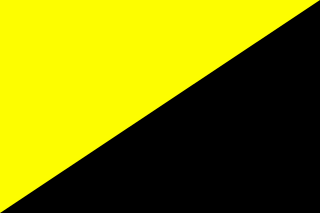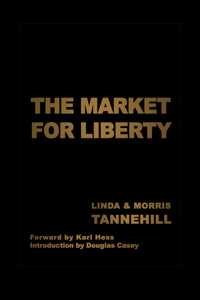Related Research Articles

Anarcho-capitalism is an anti-statist, libertarian political philosophy and economic theory that seeks to abolish centralized states in favor of stateless societies with systems of private property enforced by private agencies, based on concepts such as the non-aggression principle, free markets and self-ownership. An anarcho-capitalist philosophy extends the concept of ownership to include control of private property as part of the self, and, in some cases, control of other people as private property. In the absence of statute, anarcho-capitalists hold that society tends to contractually self-regulate and civilize through participation in the free market, which they describe as a voluntary society involving the voluntary exchange of goods and services. In a theoretical anarcho-capitalist society a system of private property would still exist, and would be enforced by private defense agencies and/or insurance companies that were selected by property owners, whose ownership rights or claims would be enforced by private defence agencies and/or insurance companies. These agencies or companies would operate competitively in a market and fulfill the roles of courts and the police, similar to a state apparatus. Some anarcho-capitalist authors have argued that slavery is compatible with anarcho-capitalist ideals.
Capitalism is an economic system based on the private ownership of the means of production and their operation for profit. The defining characteristics of capitalism include capital accumulation, competitive markets, price systems, private property, recognition of property rights, self-interest, economic freedom, meritocracy, work ethic, consumer sovereignty, economic efficiency, limited role of government, profit motive, a financial infrastructure of money and investment that makes possible credit and debt, entrepreneurship, commodification, voluntary exchange, wage labor, production of commodities and services, and a strong emphasis on innovation and economic growth. In a market economy, decision-making and investments are determined by owners of wealth, property, or ability to maneuver capital or production ability in capital and financial markets—whereas prices and the distribution of goods and services are mainly determined by competition in goods and services markets.
Finance refers to monetary resources and to the study and discipline of money, currency, assets and liabilities. As a subject of study, it is related to but distinct from economics, which is the study of the production, distribution, and consumption of goods and services. Based on the scope of financial activities in financial systems, the discipline can be divided into personal, corporate, and public finance.

The Color Purple is a 1982 epistolary novel by American author Alice Walker that won the 1983 Pulitzer Prize for Fiction and the National Book Award for Fiction.

Finance capitalism or financial capitalism is the subordination of processes of production to the accumulation of money profits in a financial system.

Venture capital (VC) is a form of private equity financing provided by firms or funds to startup, early-stage, and emerging companies, that have been deemed to have high growth potential or that have demonstrated high growth in terms of number of employees, annual revenue, scale of operations, etc. Venture capital firms or funds invest in these early-stage companies in exchange for equity, or an ownership stake. Venture capitalists take on the risk of financing start-ups in the hopes that some of the companies they support will become successful. Because startups face high uncertainty, VC investments have high rates of failure. Start-ups are usually based on an innovative technology or business model and they are often from high technology industries, such as information technology (IT), clean technology or biotechnology.

The 1997 Asian financial crisis was a period of financial crisis that gripped much of East and Southeast Asia during the late 1990s. The crisis began in Thailand in July 1997 before spreading to several other countries with a ripple effect, raising fears of a worldwide economic meltdown due to financial contagion. However, the recovery in 1998–1999 was rapid, and worries of a meltdown quickly subsided.
Peter Lynch is an American investor, mutual fund manager, author and philanthropist. As the manager of the Magellan Fund at Fidelity Investments between 1977 and 1990, Lynch averaged a 29.2% annual return, consistently more than double the S&P 500 stock market index and making it the best-performing mutual fund in the world. During his 13-year tenure, assets under management increased from US$18 million to $14 billion.
Military Keynesianism is an economic policy based on the position that government should raise military spending to boost economic growth. It is a fiscal stimulus policy as advocated by John Maynard Keynes. But where Keynes advocated increasing public spending on socially useful items, additional public spending is allocated to the arms industry, the area of defense being that over which the executive exercises greater discretionary power. Typical examples of such policies are Nazi Germany, or the United States during and after World War II, during the presidencies of Franklin D. Roosevelt and Harry S. Truman. This type of economy is linked to the interdependence between welfare and warfare states, in which the latter feeds the former, in a potentially unlimited spiral. The term is often used pejoratively to refer to politicians who apparently reject Keynesian economics, but use Keynesian arguments in support of excessive military spending.
The nature of capitalism is criticized by left-wing anarchists, who reject hierarchy and advocate stateless societies based on non-hierarchical voluntary associations. Anarchism is generally defined as the libertarian philosophy which holds the state to be undesirable, unnecessary and harmful as well as opposing authoritarianism, illegitimate authority and hierarchical organization in the conduct of human relations. Capitalism is generally considered by scholars to be an economic system that includes private ownership of the means of production, creation of goods or services for profit or income, the accumulation of capital, competitive markets, voluntary exchange and wage labor, which have generally been opposed by most anarchists historically. Since capitalism is variously defined by sources and there is no general consensus among scholars on the definition nor on how the term should be used as a historical category, the designation is applied to a variety of historical cases, varying in time, geography, politics and culture.

John Clifton "Jack" Bogle was an American investor, business magnate and philanthropist. He was the founder and chief executive of The Vanguard Group and is credited with popularizing the index fund. An avid investor and money manager himself, he preached investment over speculation, long-term patience over short-term action and reducing broker fees as much as possible. An ideal investment vehicle for Bogle was a low-cost index fund representing the entire US market, held over a lifetime with dividends reinvested.

Hyman Philip Minsky was an American economist, a professor of economics at Washington University in St. Louis, and a distinguished scholar at the Levy Economics Institute of Bard College. His research attempted to provide an understanding and explanation of the characteristics of financial crises, which he attributed to swings in a potentially fragile financial system. Minsky is sometimes described as a post-Keynesian economist because, in the Keynesian tradition, he supported some government intervention in financial markets, opposed some of the financial deregulation of the 1980s, stressed the importance of the Federal Reserve as a lender of last resort and argued against the over-accumulation of private debt in the financial markets.

For a New Liberty: The Libertarian Manifesto is a book by American economist and historian Murray Rothbard, in which the author promotes anarcho-capitalism. The work has been credited as an influence on modern libertarian thought and on part of the New Right.

The Market for Liberty is a significant anarcho-capitalist book written by Linda and Morris Tannehill. It was preceded by the self-published Liberty via the Market in 1969. The work challenges statutory law and advocates natural law as the basis for society. It also argues that society would not be lawless in the absence of the state. The Market for Liberty spends a great deal of time outlining how different businesses and organizational structures would interact in a laissez-faire society and how these interactions would create checks which would ultimately keep the tendency for crime low. In keeping with radical free-market principles, the book is skeptical about the potential for violent anarcho-capitalist revolution to bring about good outcomes.

William Kent Krueger is an American novelist and crime writer, best known for his series of novels featuring Cork O'Connor, which are set mainly in Minnesota. In 2005 and 2006, he won back-to-back Anthony Awards for best novel. In 2014, his stand-alone book Ordinary Grace won the Edgar Award for Best Novel of 2013. In 2019, This Tender Land was on the New York Times bestseller list for nearly six months.

The Ministry of Economy, Trade and Business (MINECO) is the department of the Government of Spain responsible for proposing and carrying out the government policy on economic affairs, through reforms to improve competitiveness and trade, focused on business support and the potential growth of the economy. At the same time, it directs the commercial policy of internationalization of companies, as well as the supervision of investments and foreign transactions.
Timescape Books was a science fiction line from Pocket Books operating from 1981 to 1985. Pocket Books is an imprint of Simon & Schuster.

More Money Than God: Hedge Funds and the Making of a New Elite (2010) is a financial book by Sebastian Mallaby published by Penguin Press. Mallaby's work has been published in the Financial Times, The Washington Post, The New York Times, The Wall Street Journal, and the Atlantic Monthly as columnist, editor and editorial board member. He is a senior fellow for international economics at the Council on Foreign Relations (CFR). The book is a history of the hedge fund industry in the United States looking at the people, institutions, investment tools and concepts of hedge funds. It claims to be the "first authoritative history of the hedge fund industry." It is written for a general audience and originally published by Penguin Press. It was nominated for the 2010 Financial Times and Goldman Sachs Business Book of the Year Award and was one of The Wall Street Journal's 10-Best Books of 2010. The Journal said it was "The fullest account we have so far of a too-little-understood business that changed the shape of finance and no doubt will continue to do so."
This is the complete list of works by military science fiction and space opera author David Weber.
This is complete list of works by American science fiction and historical fiction author Eric Flint (1947–2022).
References
- 1 2 "Publicado en el Boletín Oficial de Salta Nº 19807 el día 23/06/2016". Boletín Oficial – Provincia de Salta. Archived from the original on May 26, 2019. Retrieved May 26, 2019.
- 1 2 Waggoner, John (February 19, 2009). "Investors are grabbing for dangled karats". USA Today . Retrieved March 23, 2015.
- 1 2 3 Foster, Nick (February 25, 2010). "Projects Draw Attention to Argentine Countryside". New York Times. Retrieved March 28, 2015.
- 1 2 Sykora, Allen (May 11, 2011). "Doug Casey: Government Policies Distort Markets; 'Printing More Money' To Mean Inflation". Forbes.com. Retrieved March 23, 2015.
- ↑ July 13, 2013 C-SPAN2 Book TV interview with Doug Casey at Freedomfest 2013, held at Las Vegas.
- ↑ Sien, 2015. 22:00 min. in
- 1 2 3 Knight, Jerry (August 25, 1980). "Doomsayer Casey: 'I Believe in Buying When There's Blood in the Streets'". The Washington Post .
- ↑ Strauss, Valerie (June 10, 2010). "What Americans used to read". The Washington Post . Archived from the original on January 7, 2012. Retrieved March 23, 2015.
- ↑ "Doug Casey". Voice America. Retrieved March 28, 2015.
- ↑ James, Louis (November 14, 2012). "Doug Casey on the Inconvenient Truths of US Foreign Policy". Casey Research. Retrieved August 2, 2019.
- ↑ "Doug Casey on What Happens After the Next War". Investment Watch. June 7, 2019. Retrieved August 2, 2019.
- ↑ "Doug Casey' Books". High Ground Series - A collection of books by Doug Casey.
- ↑ "Right on the Money: Doug Casey on Economics, Investing, and the Ways of the Real World with Louis James", Wiley.com.